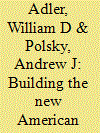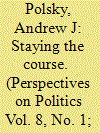|
|
|
Sort Order |
|
|
|
Items / Page
|
|
|
|
|
|
|
| Srl | Item |
| 1 |
ID:
096159


|
|
|
|
|
| Publication |
2010.
|
| Summary/Abstract |
Contend that contrary to traditional notions of a weak national state in our nation's early years, the national state, acting through the Army, was indispensable in shaping the pattern and direction of economic development. They propose a new way of conceptualizing the early American state: a state of the periphery, dominated by the Army, and a state of the center, in which other public institutions also performed key development functions.
|
|
|
|
|
|
|
|
|
|
|
|
|
|
|
|
| 2 |
ID:
096285


|
|
|
|
|
| Publication |
2010.
|
| Summary/Abstract |
Military stalemate in Iraq and Vietnam presents a puzzle: why do presidents persist in a strategic course that has failed to secure the goals they defined when they chose to embark upon war? In the face of a quagmire, presidents might choose among three broad strategic options-disengagement, escalation, or continuity. I argue that the first alternative, to withdraw, is made impossible by the inflated rhetoric presidents invoke to sell a skeptical public on the necessity for a limited war and by their own conviction (reinforced by core supporters) that the price of defeat is too great. At the opposite pole lies the possibility of full-scale mobilization. But because presidents during the Vietnam and Iraq wars believed they could also pursue expensive domestic agendas, they did not reserve the resources needed for large-scale escalation. In the both cases, too, civilian leaders were deeply skeptical about their military counterparts and discounted their caution that a greater military commitment would be needed. Finally, as wars drag on, public disenchantment prevents presidents from mustering the political support escalation would require. Their early decisions thus leave them with no alternative to their current strategic commitment.
|
|
|
|
|
|
|
|
|
|
|
|
|
|
|
|
|
|
|
|
|